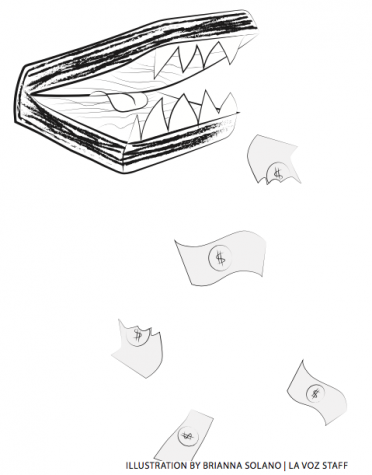A call for open source textbooks
May 17, 2016
Ninety dollars, sometimes over a hundred, even. Walking away from the bookstore with a full set of math textbooks for a calculus course can easily set a student back by over two hundred. Add in online components, and that number only grows. The College Board estimates that the average full-time student would have to spend $1,200 alone in books and materials. The textbook industry costs already financially overburdened students massive amounts of money, and the solution is clear: Open source textbooks must become commonplace in De Anza classrooms.
The short answer to the questions of how and why the textbook market exists in it’s current form can be found in the market landscape, which resembles a classic oligopoly. A short walk down the aisles of the De Anza College Bookstore yields stacks of publications students who have to pick up produced by mostly either Pearson, McGraw-Hill, or Houghton Mifflin Harcourt.
Houghton Mifflin Harcourt alone holds a 44 percent market share as of 2014, according to the Center for Media and Democracy’s PRWatch, putting it in a position to artificially mark up the prices of its products, and the same goes for the rest of the publishers.
The status quo stifles competition and allows for even larger price increases without significant improvements to the end product. It’s like selling a last-generation iPad at a higher price and not taking no for an answer. Attempts to segment the market by creating a De Anza College-exclusive edition, or custom edition of a textbook further limits the ability of the end product to be transferred or even exchanged.
While it is unlikely that anything will change on the side of the textbook industry, there may still be a better alternative out there for the tab every quarter: Open source textbooks.
Open source textbooks are compiled by outside groups and individuals and provided, often free of cost, to students in lieu of, say, an expensive sciences textbook. Recently, and with the proliferation of internet- based publishers, open source textbooks have become more of a viable alternative as more and more sources are published and peer-reviewed.
That is not to say that these are a silver bullet. There are certain tradeoffs in quality and availability of online components that must be weighed by students, faculty and administration alike.
However, the fact that the De Anza Administration is in the process of creating a “De Anza Textbook Affordability/ Open Educational Resources” initiative indicates they are amenable to the option, and that may just be what is necessary to ease the costs that students will have to deal with this fall.

